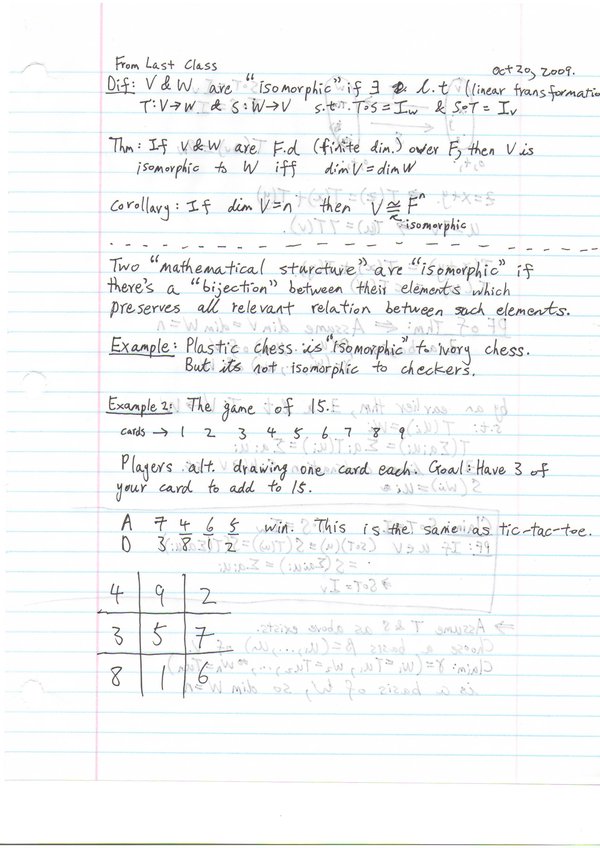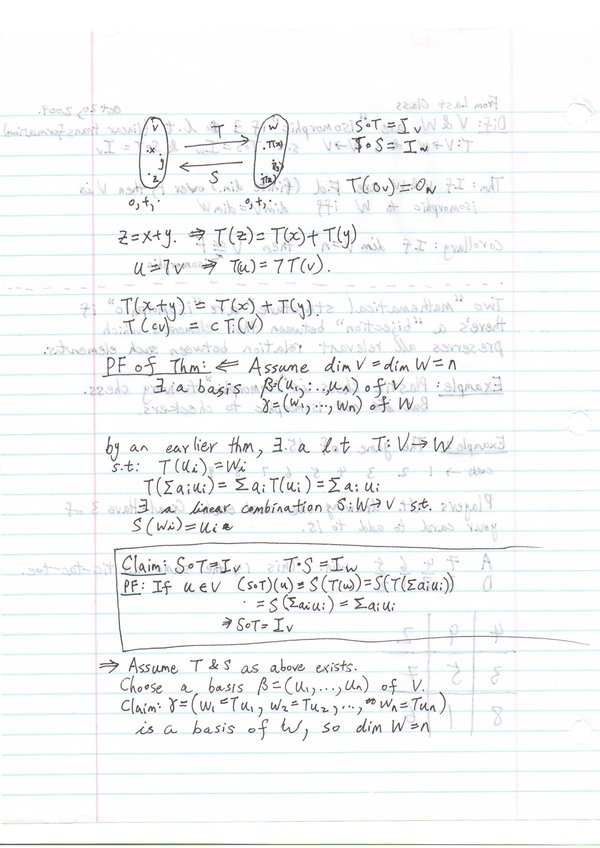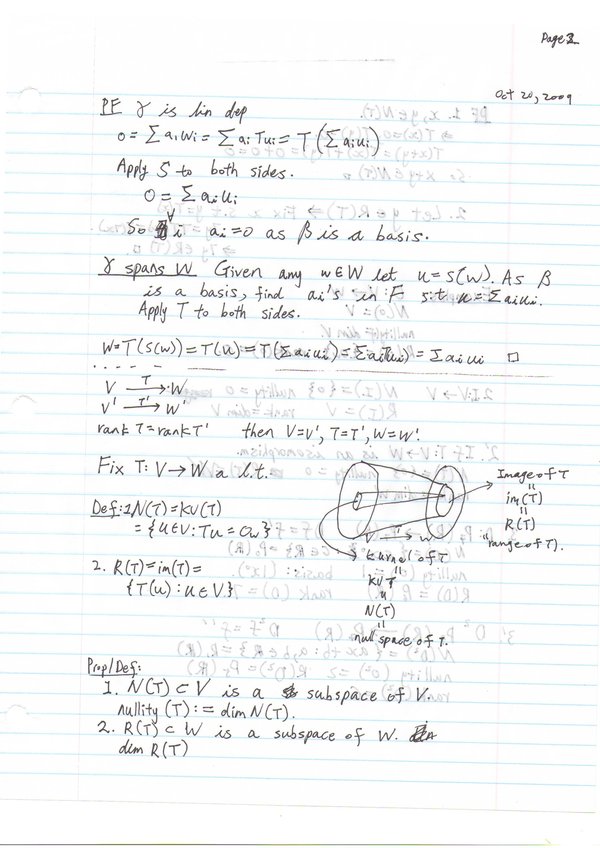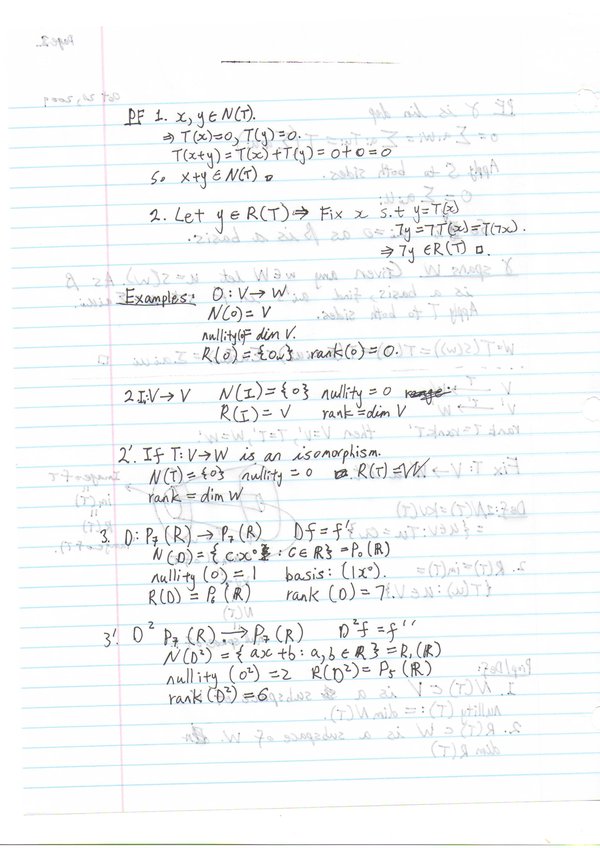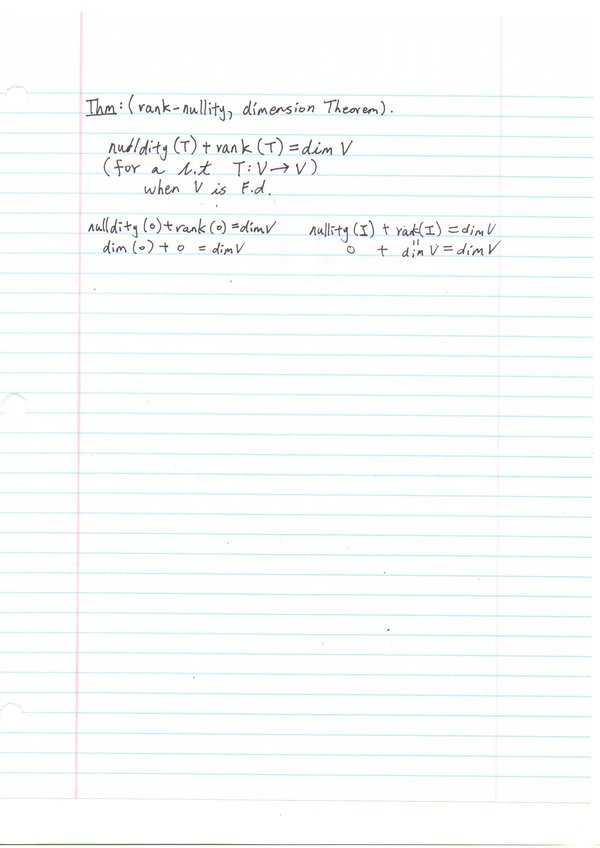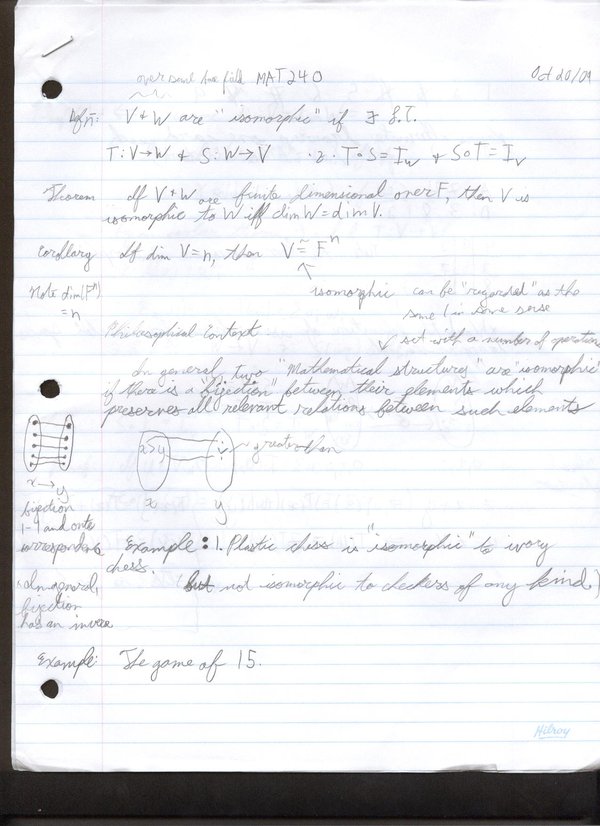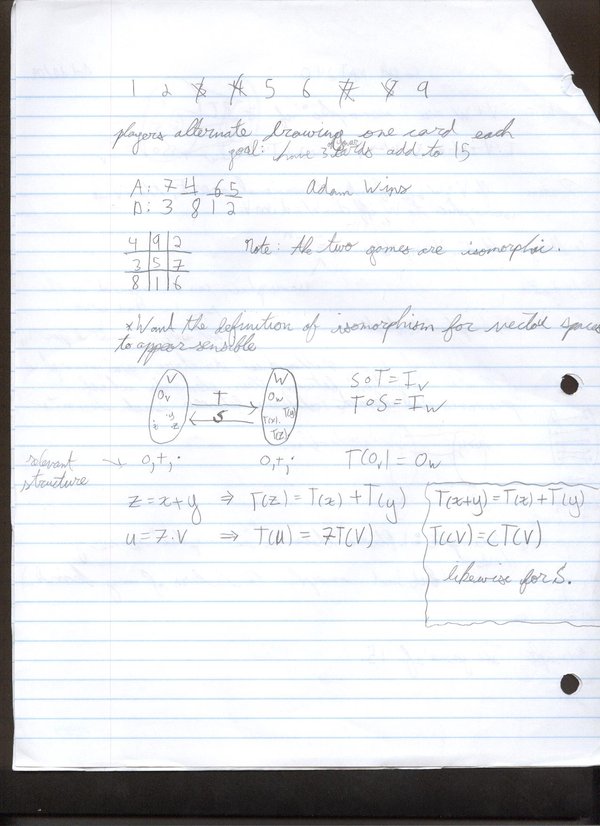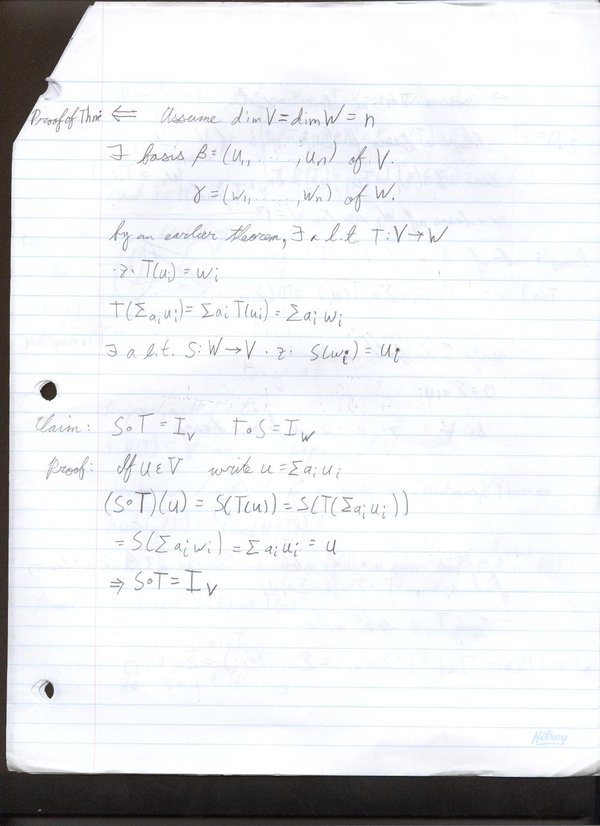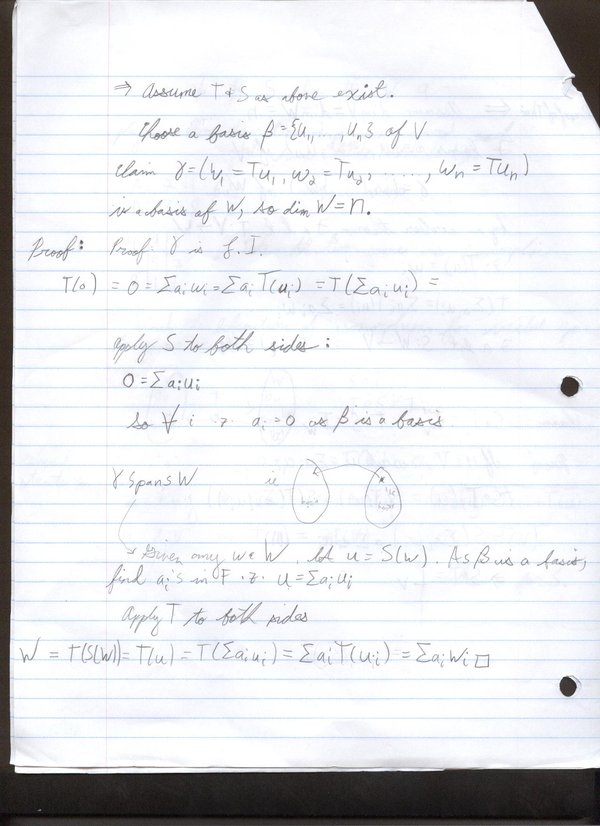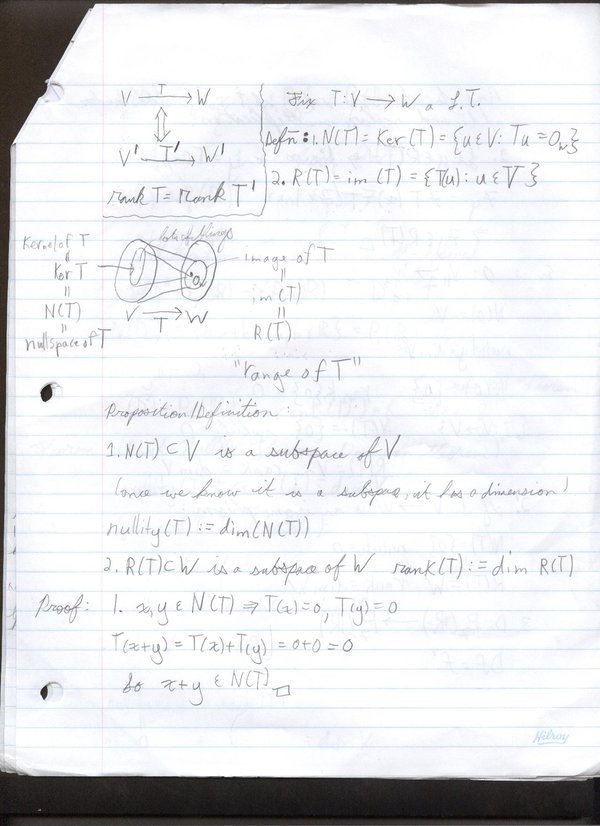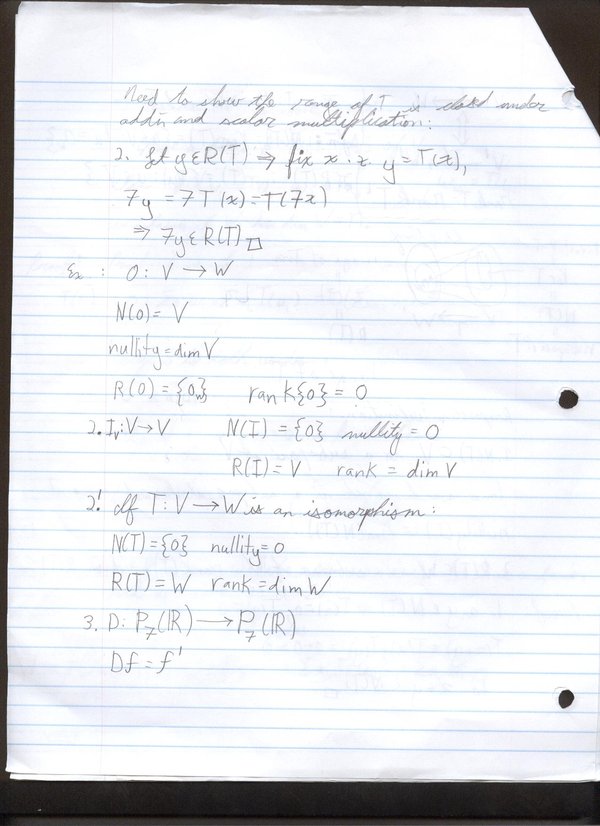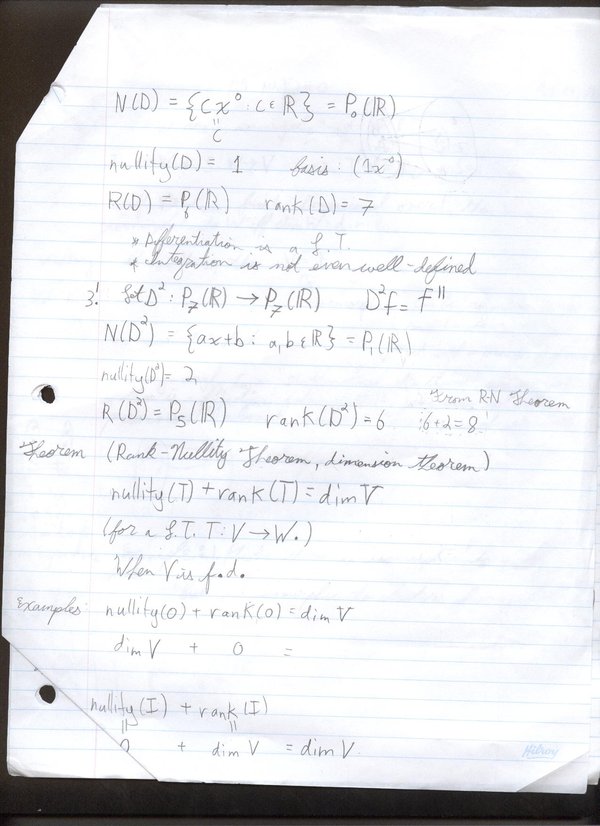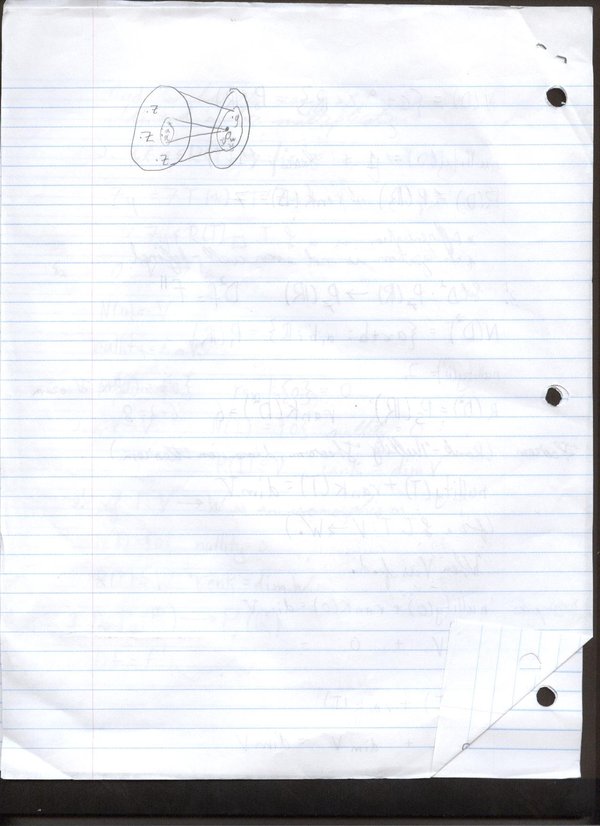09-240/Classnotes for Tuesday October 20: Difference between revisions
No edit summary |
No edit summary |
||
| (8 intermediate revisions by 4 users not shown) | |||
| Line 1: | Line 1: | ||
{{09-240/Navigation}} |
|||
== Definition == |
|||
{{09-240/Class Notes Warning}} |
|||
V & W are "isomorphic" if there exists a linear transformation T:V → W & S:W → V such that T∘S=I<sub>W</sub> and S∘T=I<sub>V</sub> |
|||
'''Definition''': '''V''' and '''W''' are "isomorphic" if there exist linear transformations <math>\mathrm{T : V \rightarrow W}</math> and <math>\mathrm{S : W \rightarrow V}</math> such that <math>\mathrm{T \circ S} = I_\mathrm{W}</math> and <math>\mathrm{S \circ T} = I_\mathrm{V}</math> |
|||
== Theorem == |
|||
If V& W are field dimensions over F, then V is isomorphic to W iff dim V=dim W |
|||
'''Theorem''': If '''V''' and '''W''' are finite-dimensional over ''F'', then '''V''' is isomorphic to '''W''' iff dim('''V''') = dim('''W''') |
|||
'''Corollary''': If dim('''V''') = ''n'' then <math>\mathrm{V} \cong F^n</math> |
|||
== Corollary == |
|||
:Note: <math>\cong</math> represents "is isomorphic to" |
|||
:Note: <math> \cong </math> represents isomorphism |
|||
---- |
|||
Two "mathematical structures" are "isomorphic" if there's a "bijection" between their elements which preserves all relevant relations between such elements. |
|||
Two "mathematical structures" are "isomorphic" if there exists a "bijection" between their elements which preserves all relevant relations between such elements. |
|||
Example: |
|||
Plastic chess is "isomorphic" to ivory chess, but it is not isomorphic to checkers. |
|||
'''Example''': Plastic chess is "isomorphic" to ivory chess, but it is not isomorphic to checkers. |
|||
'''Example''': The game of 15. Players alternate drawing one card each. |
|||
Ex: |
|||
The game of 15. Players alternate drawing one card each. |
|||
Goal: To have exactly three of your cards add to 15. |
Goal: To have exactly three of your cards add to 15. |
||
Sample game: |
|||
O: 7, ''4, 6, 5'' → Wins! |
|||
* X picks 3 |
|||
X: 3, 8, 1, 2 |
|||
* O picks 7 |
|||
* X picks 8 |
|||
* O picks ''4'' |
|||
* X picks 1 |
|||
* O picks ''6'' |
|||
* X picks 2 |
|||
* O picks ''5'' |
|||
* 4 + 6 + 5 = 15. O wins. |
|||
This game is isomorphic to Tic Tac Toe! |
This game is isomorphic to Tic Tac Toe! |
||
{| class="wikitable" border=" |
{| class="wikitable" border="0" cellpadding="2" cellspacing="0" |
||
|- |
|- |
||
| style="border-style: none solid solid none" | 4 |
|||
| 4 |
|||
| style="border-style: none solid solid solid" | 9 |
|||
| 9 |
|||
| style="border-style: none none solid solid" | 2 |
|||
| 2 |
|||
|- |
|- |
||
| style="border-style: solid solid solid none" | 3 |
|||
| 3 |
|||
| style="border-style: solid solid solid solid" | 5 |
|||
| 5 |
|||
| style="border-style: solid none solid solid" | 7 |
|||
| 7 |
|||
|- |
|- |
||
| style="border-style: solid solid none none" | 8 |
|||
| 8 |
|||
| style="border-style: solid solid none solid" | 1 |
|||
| 1 |
|||
| style="border-style: solid none none solid" | 6 |
|||
| 6 |
|||
|} |
|} |
||
: X: 3, 8, 1, 2 |
|||
: O: 7, ''4'', ''6'', ''5'' -- Wins! |
|||
Converts to: |
Converts to: |
||
{| class="wikitable" border=" |
{| class="wikitable" border="0" cellpadding="2" cellspacing="0" |
||
|- |
|- |
||
| style="border-style: none solid solid none" | O |
|||
| O |
|||
| style="border-style: none solid solid solid" | 9 |
|||
| 9 |
|||
| style="border-style: none none solid solid" | X |
|||
| X |
|||
|- |
|- |
||
| style="border-style: solid solid solid none" | X |
|||
| X |
|||
| style="border-style: solid solid solid solid" | O |
|||
| O |
|||
| style="border-style: solid none solid solid" | O |
|||
| O |
|||
|- |
|- |
||
| style="border-style: solid solid none none" | X |
|||
| X |
|||
| style="border-style: solid solid none solid" | X |
|||
| X |
|||
| style="border-style: solid none none solid" | O |
|||
| O |
|||
|} |
|} |
||
: <math>\mathrm{S \circ T} = I_\mathrm{V}</math> |
|||
: S∘T=I<sub>V</sub> |
|||
: <math>\mathrm{T \circ S} = I_\mathrm{W}</math> |
|||
: T∘S=I<sub>W</sub> |
|||
: <math>\mathrm T(O_\mathrm{V}) = O_\mathrm{W}</math> |
|||
: T(O<sub>V</sub>)=O<sub>W</sub> |
|||
: T(x+y)=T(x)+T(y) |
: <math>\mathrm T(x + y) = T(x) + T(y)</math> |
||
: <math>\mathrm T(cv) = c\mathrm T(v)</math> |
|||
: T(cV)=cT(V) |
|||
: Likewise for <math> |
: Likewise for <math>\mathrm S</math> |
||
: z=x+y |
: <math>z = x + y \Rightarrow \mathrm T(z) = \mathrm T(x) + \mathrm T(y)</math> |
||
: u=7v |
: <math>u = 7v \Rightarrow \mathrm T(u) = 7\mathrm T(v)</math> |
||
Proof of Theorem <math> |
Proof of Theorem <math>\iff</math> Assume dim('''V''') = dim('''W''') = ''n'' |
||
: There exists basis <math>\beta = \{u_1, \ldots, u_n\} \in \mathrm V</math> |
|||
: ∃ basis β= (U<sub>1</sub>...U<sub>n</sub>) of V |
|||
: <math>\alpha = \{w_1, ..., w_n\} \in \mathrm W</math> |
|||
: α=(W<sub>1</sub>...W<sub>n</sub>) of W |
|||
: by an earlier theorem, |
: by an earlier theorem, there exists a l.t. <math>\mathrm{T : V \rightarrow W}</math> such that <math>\mathrm T(u_i) = w_i</math> |
||
<math>\mathrm T(\sum a_i u_i) = \sum a_i \mathrm T(u_i) = \sum a_i w_i</math> |
|||
(T(∑a<sub>i</sub>u<sub>i</sub>)=∑a<sub>i</sub>T(u<sub>i</sub>)=∑a<sub>i</sub>u<sub>i</sub>) |
|||
There exists a l.t. <math>\mathrm{S : W \rightarrow V}</math> such that <math>\mathrm S(w_i) = u_i</math> |
|||
∃ a l.t. S:W→V s.t. S(W<sub>i</sub>)=U<sub>i</sub> |
|||
== Claim == |
== Claim == |
||
: <math>\mathrm{S \circ T} = I_\mathrm{V}</math> |
|||
: S∘T=I<sub>v</sub> |
|||
: <math>\mathrm{T \circ S} = I_\mathrm{W}</math> |
|||
: T∘S=I<sub>w</sub> |
|||
| Line 105: | Line 116: | ||
: Given any w∈W let u=S(W) |
: Given any w∈W let u=S(W) |
||
: As β is a basis find a<sub>i</sub>s in F s.t. v=∑a<sub>i</sub>u<sub>i</sub> |
: As β is a basis find a<sub>i</sub>s in F s.t. v=∑a<sub>i</sub>u<sub>i</sub> |
||
Apply T to both sides: T(S(W))=T(u)=T(∑a<sub>i</sub>u<sub>i</sub>)=∑a<sub>i</sub>T(u<sub>i</sub>)=∑a<sub>i</sub>W<sub>i</sub> |
Apply T to both sides: T(S(W))=T(u)=T(∑a<sub>i</sub>u<sub>i</sub>)=∑a<sub>i</sub>T(u<sub>i</sub>)=∑a<sub>i</sub>W<sub>i</sub> |
||
::: ∴ I win!!! (QED) |
|||
: T T |
|||
: V → W ⇔ V' → W' |
|||
: rank T=rank T' |
|||
Fix t:V→Wa l.t.<math>Insert formula here</math> |
|||
== Definition == |
|||
# N(T) = ker(T) = {u∈V : Tu = 0<sub>W</sub>} |
|||
# R(T) = <sub>i</sub>m(T) = {T(u) : u∈V} |
|||
== Prop/Def == |
|||
# N(T) ⊂ V is a subspace of V-------nullity(T) := dim N(T) |
|||
# R(T) ⊂ W is a subspace of W--------rank(T) := dim R(T) |
|||
== Proof 1 == |
|||
: x,y ∈N(T)⇒T(x)=0, T(y)=0 |
|||
: T(x+y)=T9x)+T(y)=0+0=0 |
|||
: x+y∈N(T) |
|||
::: ∴ I win!!! (QED) |
|||
== Proof 2 == |
|||
: Let y∈R(T)⇒fix x s.t y=T(x), |
|||
: --------7y=7T(x)=T(7x) |
|||
: ----------⇒7y∈R(T) |
|||
::: ∴ I win!!! (QED) |
|||
== Examples == |
|||
1. |
|||
: 0:V→W---------N(0)=V |
|||
: R(0)={0<sub>W</sub>}-----------nullity(0)=dim V |
|||
: --------------rank(0)=0 |
|||
:: dim V+0=dimV |
|||
2. |
|||
:I<sub>V</sub>:V→V |
|||
:N(I)={0} |
|||
:nullity=0 |
|||
:R(I)=dim V |
|||
:2'If T:V→W is an imorphism |
|||
:N(T)={0} |
|||
:nullity =0 |
|||
:R(T)=W |
|||
:rank=dim W |
|||
::0+dim V=dim V |
|||
3. |
|||
:D:P<sub>7</sub>(R)→P<sub>7</sub>(R) |
|||
:Df=f' |
|||
::N(D)={C⊃C°: C∈R}=P<sub>0</sub>(R) |
|||
:R(D)⊂P<sub>6</sub>(R) |
|||
::nullity(D)=1 |
|||
::basis:(1x°) |
|||
::rank(D)=7 |
|||
:::7+1=8 |
|||
4. |
|||
:3':D<sup>2</sup>:P<sub>7</sub>(R) |
|||
:D<sup>2</sup>f=f'' |
|||
:W(D<sup>2</sup>)={ax+b: a,b∈R}=P<sub>1</sub>(R) |
|||
::nullity(D<sup>2</sup>)=2 |
|||
::R(D<sup>2</sup>)=P<sub>5</sub>(R) |
|||
:::rank (D<sup>2</sup>)=6 |
|||
::6+2=8 |
|||
== Theorem == |
|||
(rank-nullity Theorem, a.k.a. dimension Theorem) |
|||
:nullity(T)+rank(T)=dim V |
|||
:(for a l.t. T:V→W) when V is F.d. |
|||
== Proof == |
|||
(To be continued next day) |
|||
[[Image:Oct 20 Lecture Notes Page 1.JPG|600px]] |
|||
[[Image:Oct 20 Lecture Notes Page 2.JPG|600px]] |
|||
[[Image:Oct 20 Lecture Notes Page 3.JPG|600px]] |
|||
[[Image:Oct 20 Lecture Notes Page 4.JPG|600px]] |
|||
[[Image:Oct 20 Lecture Notes Page 5.JPG|600px]] |
|||
[[Image:Oct20note1.jpg|600px]] |
|||
[[Image:Oct20note2.jpg|600px]] |
|||
[[Image:Oct20note3.jpg|600px]] |
|||
[[Image:Oct20note4.jpg|600px]] |
|||
[[Image:Oct20note5.jpg|600px]] |
|||
[[Image:Oct20note6.jpg|600px]] |
|||
[[Image:Oct20note7.jpg|600px]] |
|||
[[Image:Oct20note8.jpg|600px]] |
|||
Latest revision as of 09:56, 14 December 2009
| ||||||||||||||||||||||||||||||||||||||||||||||||||||||||||||||||||
Definition: V and W are "isomorphic" if there exist linear transformations and such that and
Theorem: If V and W are finite-dimensional over F, then V is isomorphic to W iff dim(V) = dim(W)
Corollary: If dim(V) = n then
- Note: represents "is isomorphic to"
Two "mathematical structures" are "isomorphic" if there exists a "bijection" between their elements which preserves all relevant relations between such elements.
Example: Plastic chess is "isomorphic" to ivory chess, but it is not isomorphic to checkers.
Example: The game of 15. Players alternate drawing one card each.
Goal: To have exactly three of your cards add to 15.
Sample game:
- X picks 3
- O picks 7
- X picks 8
- O picks 4
- X picks 1
- O picks 6
- X picks 2
- O picks 5
- 4 + 6 + 5 = 15. O wins.
This game is isomorphic to Tic Tac Toe!
| 4 | 9 | 2 |
| 3 | 5 | 7 |
| 8 | 1 | 6 |
- X: 3, 8, 1, 2
- O: 7, 4, 6, 5 -- Wins!
Converts to:
| O | 9 | X |
| X | O | O |
| X | X | O |
- Likewise for
Proof of Theorem Assume dim(V) = dim(W) = n
- There exists basis
- by an earlier theorem, there exists a l.t. such that
There exists a l.t. such that
Claim
Proof
If u∈ unto U=∑aiui
- (S∘T)(u)=S(T(u))=S(T(∑aiui))
- =S(∑aiwi)=∑aiui=u
- ⇒S∘T=Iv...
- ⇒Assume T&S as above exist
- Choose a basis β= (U1...Un) of V
Claim
α=(W1=Tu1, W2=Tu2, ..., Wn=Tun)
- is a basis of W, so dim W=n
Proof
α is lin. indep.
- T(0)=0=∑aiwi=∑aiTui=T(∑aiui)
- Apply S to both sides:
- 0=∑aiui
- So ∃iai=0 as β is a basis
α Spans W
- Given any w∈W let u=S(W)
- As β is a basis find ais in F s.t. v=∑aiui
Apply T to both sides: T(S(W))=T(u)=T(∑aiui)=∑aiT(ui)=∑aiWi
- ∴ I win!!! (QED)
- T T
- V → W ⇔ V' → W'
- rank T=rank T'
Fix t:V→Wa l.t.
Definition
- N(T) = ker(T) = {u∈V : Tu = 0W}
- R(T) = im(T) = {T(u) : u∈V}
Prop/Def
- N(T) ⊂ V is a subspace of V-------nullity(T) := dim N(T)
- R(T) ⊂ W is a subspace of W--------rank(T) := dim R(T)
Proof 1
- x,y ∈N(T)⇒T(x)=0, T(y)=0
- T(x+y)=T9x)+T(y)=0+0=0
- x+y∈N(T)
- ∴ I win!!! (QED)
Proof 2
- Let y∈R(T)⇒fix x s.t y=T(x),
- --------7y=7T(x)=T(7x)
- ----------⇒7y∈R(T)
- ∴ I win!!! (QED)
Examples
1.
- 0:V→W---------N(0)=V
- R(0)={0W}-----------nullity(0)=dim V
- --------------rank(0)=0
- dim V+0=dimV
2.
- IV:V→V
- N(I)={0}
- nullity=0
- R(I)=dim V
- 2'If T:V→W is an imorphism
- N(T)={0}
- nullity =0
- R(T)=W
- rank=dim W
- 0+dim V=dim V
3.
- D:P7(R)→P7(R)
- Df=f'
- N(D)={C⊃C°: C∈R}=P0(R)
- R(D)⊂P6(R)
- nullity(D)=1
- basis:(1x°)
- rank(D)=7
- 7+1=8
4.
- 3':D2:P7(R)
- D2f=f
- W(D2)={ax+b: a,b∈R}=P1(R)
- nullity(D2)=2
- R(D2)=P5(R)
- rank (D2)=6
- 6+2=8
Theorem
(rank-nullity Theorem, a.k.a. dimension Theorem)
- nullity(T)+rank(T)=dim V
- (for a l.t. T:V→W) when V is F.d.
Proof
(To be continued next day)





















